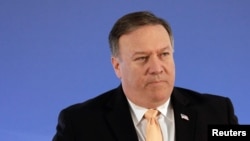U.S. Secretary of State Mike Pompeo is due to visit Pakistan on Wednesday for the first high-level official meetings with leaders of the newly-elected government in Islamabad as bilateral relations have deteriorated to the lowest ebb in the past year.
Long-running divergent views over how to fight regional terrorism and bring an end to the 17-year-old deadly conflict in Afghanistan continue to overshadow expectations for the visit to break the stalemate in Islamabad’s complicated relationship with Washington, despite both being officially allies in anti-terrorism efforts.
Pompeo will be accompanied by Joint Chiefs of Staff Chairman General Joseph Dunford when he lands in Pakistan, underscoring U.S. counterterrorism focus in engagements with the uneasy South Asian partner.
The American delegation will hold formal negotiations with Foreign Minister Shah Mehmood Qureshi and his team. Officials told VOA the visitors are also scheduled to hold separate meetings with Prime Minister Imran Khan, who took the oath of office two weeks ago, and General Qamar Javed Bajwa, the military chief.
While announcing his South Asia policy last year in a bid to break the stalemate in the U.S-backed war against the Taliban in Afghanistan, President Donald Trump accused Pakistan of playing a double game, by covertly supporting the insurgency.
Pakistan consistently denies it is providing safe havens for the insurgents. It has also been pressing Washington to try to find a negotiated end to the conflict, saying the use of military force has failed to achieve the objective and instead encouraged terrorism in the region and allowed the Taliban to capture more Afghan territory in the process.
Qureshi says his meeting with Pompeo will provide an opportunity for the two sides to “exchange views” and try to improve strained ties.
“Bilateral engagements are almost non-existent, almost in total suspension. So, we need to look as to how to move forward. We will listen to their point of view and place our stance before them,” Qureshi noted on the eve of Pompeo’s visit.
“Our objective obviously is to build our relations on the basis of mutual trust and respect,” the foreign minister emphasized.
Common enemy as focus
U.S. officials have stated that “a primary part” of the discussion during Pompeo’s visit to Pakistan will be “to make very clear what we have to do, all of our nations, in meeting” the common enemy of terrorism.
The United States would be willing to work with Pakistan to help it strengthen the national economy, but the terms of engagement with Islamabad will remain unchanged, Assistant Secretary of Defense for Asian and Pacific Security Affairs Randall G. Schriver said last week in Washington.
“I think our approach of cutting assistance and pressuring Pakistan on their relationship with the Taliban, persuading them to come to the table, dealing with terrorist networks, that will be sustained," Schriver explained while delivering a public talk at the Carnegie Endowment for International Peace.
The Pentagon also announced last week it has decided to scrap $300 million in military aid to Pakistan, citing the country’s lack of cooperation with Trump’s South Asia strategy.
But Qureshi swiftly dismissed the assertions, saying the money was not U.S. aid, but reimbursements for expenses incurred by Pakistan from its own resources for fighting regional terrorism in support of Washington’s counterterrorism efforts.
The United States has now withheld $800 million from its so-called Coalition Support Funds since the start of the year. An American military training program for Pakistani officers also stands terminated and civilian financial assistance to Islamabad has already declined to “zero,” according officials.
“America’s biggest ask, that Pakistan crack down on terrorist sanctuaries on its soil, certainly won’t be supported by Khan’s government, which has telegraphed an unwillingness to do anything at Washington’s behest,” notes Michael Kugelman, a U.S.-based expert on South Asian affairs.
Despite persistent diplomatic tensions, analysts rule out a total breakdown in U.S.-Pakistan ties. They note Washington's military mission in landlocked Afghanistan heavily depends on ground and air routes through Pakistan for ferrying key supplies to around 23,000 U.S. and NATO troops deployed in the neighboring country.
Afghan and U.S. officials have pressed Islamabad to use force against leaders and fighters of the Taliban allegedly sheltering in Pakistan to push them to engage in peace talks with the Kabul government.
Pakistani officials maintain the insurgents have gone back to the other side of the border in the wake of counterterrorism operations. Islamabad says it is ready to make all possible efforts and use its “limited” influence on the Taliban to encourage an Afghan peace dialogue.
But the Pakistan military has ruled out the possibility of launching operations against “residual” Taliban insurgents it suspects are sheltering among nearly three million Afghan refugees Pakistan still hosts.

